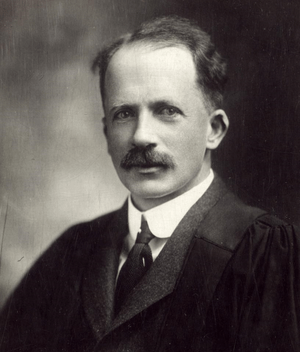John Macleod facts for kids
Quick facts for kids
John James Rickard Macleod
|
|
|---|---|
 |
|
| Born | 6 September 1876 Cluny, Scotland
|
| Died | 16 March 1935 |
| Alma mater | University of Aberdeen University of Leipzig |
| Known for | Insulin |
| Awards | Nobel Prize in Physiology or Medicine (1923) |
| Scientific career | |
| Fields | Physiology |
| Institutions | University of Toronto, Toronto, Canada |
John Macleod (born John James Rickard Macleod on 6 September 1876, died 16 March 1935) was a Scottish physiologist. A physiologist is a scientist who studies how living things work. Macleod is famous for his important work on insulin.
In 1923, he won the Nobel Prize in Physiology or Medicine. He shared this award with Frederick Banting. They received the prize for their discovery of insulin, a vital hormone.
Contents
Who Was John Macleod?
John Macleod was a brilliant scientist from Scotland. He spent many years studying how the body works. His research helped us understand important things about our health.
Early Life and Education
John Macleod was born in Cluny, Scotland. He went to the University of Aberdeen to study medicine. After that, he continued his studies at the University of Leipzig in Germany. This education helped him become a skilled physiologist.
Working in Canada
Later, Macleod moved to Canada. He worked at the University of Toronto. Here, he led a laboratory where important research took place. His lab became a key place for medical discoveries.
The Discovery of Insulin
Macleod's most famous work was on insulin. Insulin is a hormone that helps your body use sugar for energy. Without enough insulin, people can get a serious illness called diabetes.
The Research Team
In Macleod's lab, a team of scientists worked together. This team included Frederick Banting, Charles Best, and James Collip. They were all trying to find a way to treat diabetes.
A Life-Saving Breakthrough
Their hard work paid off. In 1921, the team successfully isolated insulin. This meant they found a way to get insulin from animals. Then, they could use it to treat people with diabetes. This discovery was a huge step forward in medicine. It saved many lives and changed how diabetes was treated forever.
The Nobel Prize
In 1923, John Macleod and Frederick Banting received the Nobel Prize. This was for their amazing discovery of insulin. It is one of the highest honors a scientist can get. The Nobel Prize recognized their incredible contribution to medicine.
Legacy
John Macleod's work continues to impact us today. Thanks to him and his team, millions of people with diabetes can live healthier lives. His research showed the importance of scientific teamwork. He passed away in 1935, but his legacy lives on.

